Preface
Taiwan's identity crisis is nearly a cliché at this point—it polls itself on its national identity more than any other country in the world. The identity work of Taiwanese writers unpacks this cliché, showing how identity emerges at the seams and borders with the world outside. This can seen through the narration of their own personal histories and the lives of their characters. Taiwan's production of subjectivity has long been a co-production with international and transnational actors and spaces, and literature is a major mode of its narration. Thus it should come as little surprise that many of its most celebrated writers—both domestically, if national prizes are any indication, and, internationally, thanks to masterly translations—take especial concern with encounters of de- and re-bordering as a mode of being and becoming Taiwanese, whatever that becoming Taiwanese might mean. This essay discusses encounters with four such writers—Syaman Rapongan, Liao Hung-Chi, Kao Yi-feng, and Kaori Lai, based on personal interviews and readings of their award-winning works.
Syaman Rapongan (夏曼·藍波安)
Take Syaman Rapongan as a first case. Now by far Taiwan's most recognizable ocean-facing indigenous writer, several of Syaman's more than fifteen books since the 1990s have been translated into Japanese, French, and soon English. Though Syaman's publications include a wide range of genres – from essays, mythological (oral) tales to short stories and novels – all his creative works are presented as expressions of indigenous Tao culture and their connections to a broader oceanic world. And yet, his work is rife with ambiguity and ambivalence about where he belongs—his oeuvre, like any cultural production of Taiwan, is always a work in progress, a work that expresses his own progress at a particular time and place. It is a corpus concerned with the place of the foreign in the fashioning of the self, or, as it were, the foreignness of the place of the self. Distinct from the other writers I will touch on in this brief essay, pivots on the proposition of a radical alterity of indigeneity.
Like many other indigenous writers and activists in Taiwan, Syaman embarked on a circuitous path before finding his way back home. His romps through urban national and oceanic transnational spaces gave him the empirical and conceptual resources to narrate his (re)becoming a Tao man as a rite of homecoming. During his youth, Syaman studied in Taipei and worked as a manual labourer. Spending more than two decades on "mainland Taiwan", and later traveling much of the Austronesian Pacific beyond Taiwan, he eventually made up his mind to return to his home island and relearn, reinvent, and represent ancestral practices. His books recount this life and journey at sea and home, often staging his thresholds of becoming as repeated instances of an encounter with the transnational.
The literature scholar Chiu Kuei-fen has concisely identified the core structure of Syaman's writing as one that "dramatizes the process of his journey home". And yet, as she insightfully argues, this is an unfinishable process—thresholds that can sometimes be crossed, but doors cannot be closed. Chiu strikes a Derridean note when she observes, "Paradoxically, it is the 'homing' movement in his writing that turns [Syaman] Rapongan into a figure of ambivalence and his writing a site of split identity positions. For, in spite of his self-positioning as a guardian and translator of his tribal culture, the pronounced thematic emphasis on his struggle to become a Tao man suggests that he is not yet a Tao man" (1082).
In his writing and maybe even more in his verbal performance of self, as when we met in person in October 2023, Syaman strikes a pose of radical alterity and resistance. Da Hai Fu Meng (大海浮夢), his work supported by the National Culture and Arts Foundation, begins by refuting the geographical ideology imposed on him by his teachers, whose state-crafted exams would penalize students who didn't agree that the sun sets over the mountains, a geography foreign and baffling to Syaman and his fellow islanders from Pongso no Tao, also known as Orchid Island or Lanyu (蘭嶼). His bildungsroman, The Eyes of the Ocean (大海之眼Mata Nu Wawa), likewise begins by placing himself in opposition, this time not only to Han Chinese authorities and teachers, but Western Catholic priests, who he suggests are twinned, if different, forces of colonization.
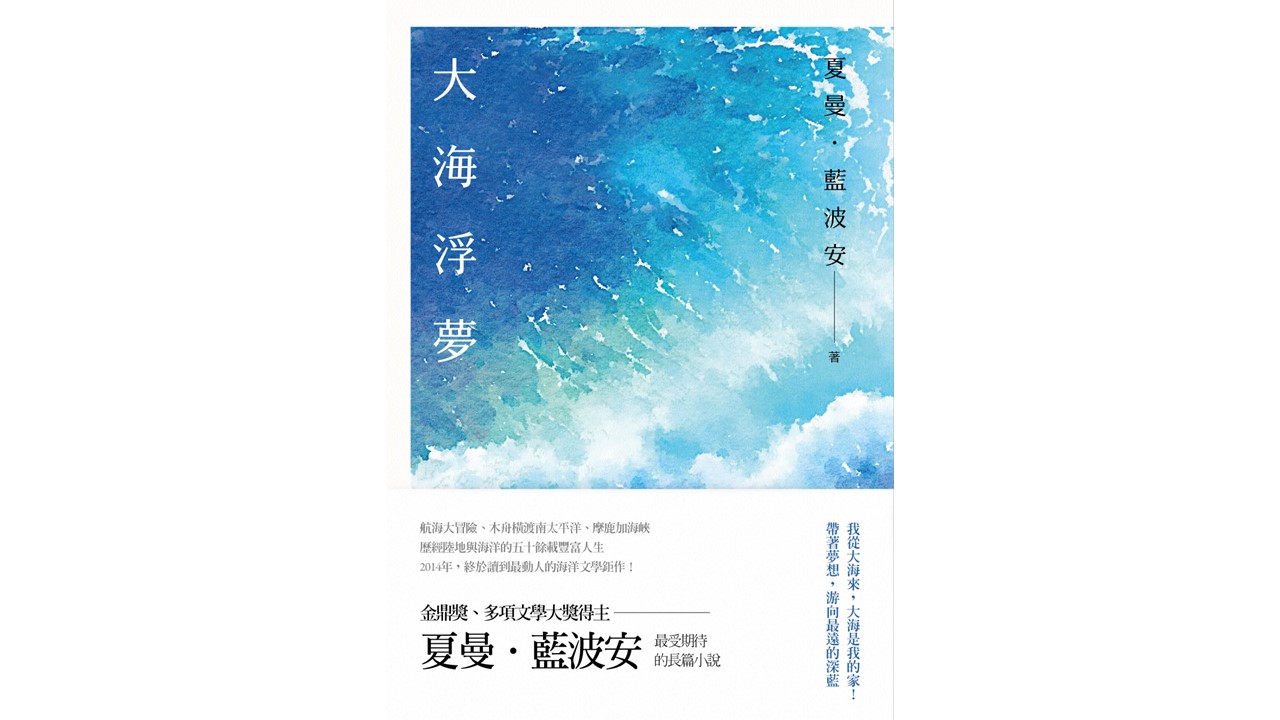
Syaman Rapongan's novel Da Hai Fu Meng (大海浮夢).
In person, Syaman Rapongan emphasized this point by citing the title of a recent Taipei Fine Arts Museum exhibition co-curated by Bruno Latour: "We don't live on the same planet". He insisted that Tao, Taiwanese of whatever type, and anyone and everyone else, are not on the same worlds. For Syaman, Tao and Taiwanese are not even in the same sea, and the latter are a 'continental' people. As he writes at the end of The Eyes of the Ocean, "The island to the west [Taiwan] is too big, and is inhabited by a continental people who write continental tales. It turns out that our oceans are different. Our ocean, the one to the east, is free from 'national boundaries,' while the one to the west is fenced in."
To further make the point beyond the human, Syaman Rapongan employs an oceanic epistemology—in which fish and trees are teachers—to assert a radically different ontology. It is perhaps telling that such a claim itself cites Euro-American scholarship, consonant with the 'ontological turn' within anthropology, which has been championed particularly by scholars of Amerindian indigeneity. Syaman expressed nothing but admiration for what he knows of the traditional knowledge of such indigenes, which he presumed dwarfs that of his or his people's knowledge. At the same time, as a writer who has crafted a unique persona through the crafting and promotion of so many books, Syaman has adopted a certain flexibility with his presentation of self as an insider or outsider. He told me how, when taking trips to China, he would simply stand and smile silently if he was introduced as a compatriot. When he toured northern Europe, he sometimes introduced himself as a Catholic in order to receive warmer welcomes, nevermind his own self-professed animism, and the lingering resentment against the condescending priests of his childhood that carries the narrative momentum of several his books.
Syaman Rapongan does not consider his work to be "pure literature". He has called it oceanic literature, or Pacific literature, and finally in summary as at the end of The Eyes of the Ocean, 'colonial island ocean literature', because he will "think in Tao and translate into Chinese, and because my spirit, my flesh, and my knowledge are nurtured by the sea". But as he says in person, what it boils down to in the end is "Syaman Rapongan Literature". Yet, even this eponymous style may give way and be subsumed by a name change yet to come—following Tao tradition, he will likely change his legal name from Syaman to Syapen (Grandfather, of whatever the child is named) in the near future when his son and daughter-in-law give him a grandchild. As a joking aside, I asked him if this means the National Museum of Taiwan Literature, with whom I'm collaborating to commission the publication of his work in translation [the above translated quotes of The Eyes of the Ocean are courtesy of Darryl Sterk], will need to produce a new contract and design a different book cover for the upcoming release of The Eyes of the Ocean. So as not to unsettle his international market, he just twinkled his eyes and said we could simply mention his newer name in a footnote, if need be.
Syaman's academic training was constituted as an encounter with the foreign: He studied French Literature at Tamkang University and anthropology at National Tsinghua University. In his telling, undertaking the French literature major was not a carefully considered decision. Rather, it was no more consciously chosen than the number on a lottery ticket—the major and the university were easier to test into than many others. Yet, early through the baosong (保送) system, in which indigenous Taiwanese could be exempted from national testing requirements, he had rejected an opportunity to study at National Taiwan Normal University or Kaohsiung Normal University, reasoning that these were ideological indoctrination centers that would force him to be guai (乖) and docile and destroy his spirit. Had he accepted these offers, he would never have become a writer, nor fashioned the extraordinary world he now lives in (when we met for dinner in the fall of 2023, he was in transit in Taipei, negotiating rights for film adaptations of his books, preparing to deliver a keynote for an international conference at Arizona State University, and contemplating an upcoming appearance with a leading Taiwanese politician). All of these achievements came through daily writing practice and recognition and financial support from Taiwan government agencies and private foundations (themselves driven by their own internal dynamics of identity and alterity, which Syaman both troubles and exploits). This success was subtended by deep engagements with the Austronesian world that later led to his acclaim. Indeed, it took a trip to the Pacific Island of Rarotonga for him to see a map that centered the Pacific and finally made him feel at home in the sea that he says is his true country, as he relates at the end of The Eyes of the Ocean. In this sense, a stable sense of self and its physical home could only be forged through a foray into the foreign.
Liao Hung-chi (廖鴻基)
Let's turn now to Liao Hung-chi. Once a fisherman, Liao also found his home in the sea, yet he is a very different sort of oceanic writer than Syaman Rapongan, and, perhaps owing to his Hoklo ancestry, one far less concerned with cultural alterity. Hailing from Hualien, where he briefly dabbled in local politics, Liao is extraordinarily prolific, having published more than 25 single-authored works since the late 1990s. Most of them are collections of essays which document his journeys on the ocean or at shores. From his early celebrated work, Beggars of the Sea (討海人, 1996) the first of his highly- regarded "The Oceanic Quartet海洋四部曲", to his most recent novel The Last Hunter of The Sea (最後的海上獵人). Complementing his identity as an oceanic writer, Liao is also an experienced whale tracker and a key figure who has raised awareness about challenges to the well-being of marine ecosystems. For decades, he has documented a variety of cetacean species on Taiwan's Pacific coast, having organised the Taiwan Cetacean Survey Group in 1996. In 1998, he founded the Kuroshio Ocean Education Foundation (黑潮基金會) and the Hualien Formosa Association (花蓮福爾摩沙協會) in 2020. He also collaborated with filmmakers and photographers to produce an eco-documentary, Whale Island (男人與他的海) in 2020. His advocacy is exemplary and propels his personal project beyond words and into action.
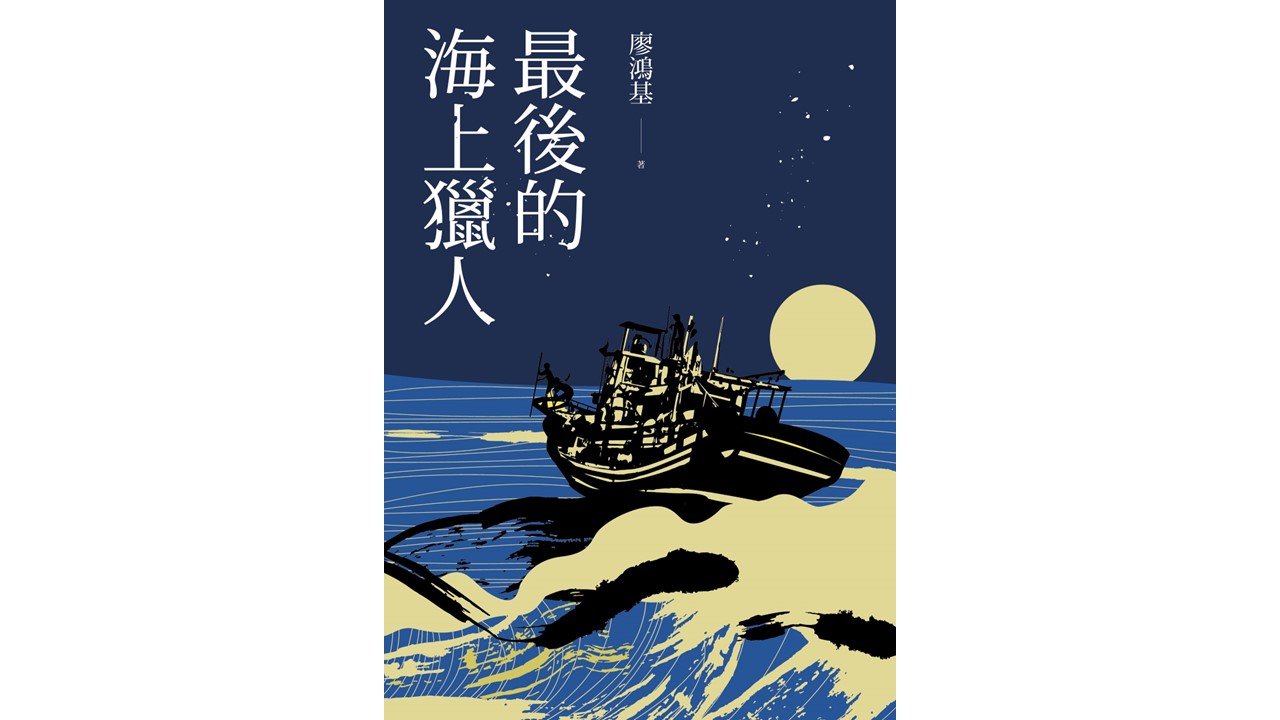
Liao Hung-chi's novel The Last Hunter of The Sea (最後的海上獵人).
Rooted in his hometown of Hualien, Liao has spent little time abroad, apart from taking a few trips to Tonga and Hawaii and other ocean-based destinations to share his work. While the ocean, for some writers, may seem foreign, for Liao it is more home than the terrestrial world. And yet, his brief experiences living and traveling overseas have brought him closer to this liquid sense of home. Decades ago, Liao worked in the shrimp industry in Gilimanuk, Indonesia, whose crystal-clear waters gave him hope for the eventual ecological recovery of Taiwan. Going to Tonga and seeing how locals there managed touristic encounters with dolphins likewise led him to relax his earlier fears that similar such interactions would necessarily be destructive to Taiwanese cetaceans. Going to highly-urbanized Singapore, where he gave talks at schools of all levels, made him understand that an island drastically smaller than Taiwan could be even more socially cut off from its oceanic surrounds. That said, Liao's oceanic orbit is largely a Taiwanese one—if he has any hopes for foreign readership of his works in translation, it's that they appreciate that Taiwan has a "world-class sea" and that they can come here and experience it.
Kao Yi-feng (高翊峰)
Kao Yi-feng cuts a very different character than Liao. For Kao, "the foreign" has informed the literary production, in as much as it consolidated his sense of Taiwaneseness and his commitment to write a microcosmic story of Taiwan's transformations into his work. For Kao, a sense of the foreign was most acutely felt when he lived in China, which years studying under Taiwan's Chinese nationalist educational regime had led him to believe was the cultural origin of Taiwan. Yet growing up as a Hakka in Miaoli County, and not learning Mandarin until enrolling in grade school, he already had a sense of cultural diversity and boundaries even within the boundaries of Taiwan, troubling received notions of national homogeneity or purity.
The only significant time spent abroad by Kao Yi-feng was in Beijing, where he served as editor-in-chief of Maxim Magazine, having been hired by its parent company, a Hong Kong-based media conglomerate. It was, he told me, a sense of being foreign there, of being an expat in what he’d been taught was his cultural homeland, that accentuated his Taiwanese identity and committed him to imbue it into his speculative fiction.
Bubble War (泡沫戰爭), published in 2014, tells of youth overthrowing the adults in a residential community following their mismanagement of its basic needs. The book contains obvious nods to classics like the work of JG Ballard and William Golding's Lord of the Flies—in fact, a protagonist is named after a transliterated version of Golding (Gaoding). Yet, Kao's interprets his own novel as being deeply rooted in Taiwan's successive waves of political reform, which were led by youth, the achievements of which he only began to truly appreciate after living in Beijing.
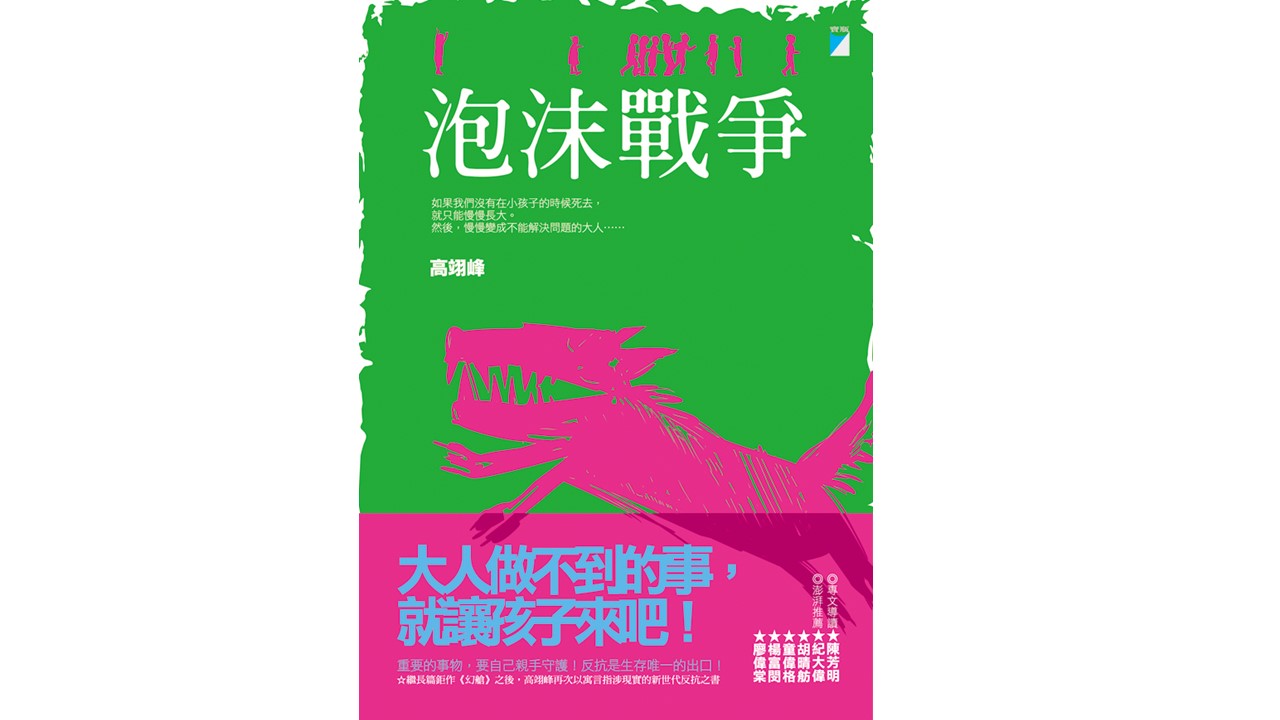
Kao Yi-feng's novel Bubble War (泡沫戰爭).
Bubble War went to press at the same time as university students occupied the Legislative Yuan in what soon became known as the Sunflower Movement, a protest against a trade bill with China that many feared would erode Taiwan's autonomy. (Confession: I joined this movement too, initially as a curious graduate student researching relations between China and Taiwan, and later wrote about it for a variety of venues). For Kao, as well as for the author of the introduction to Bubble War, National Chengchi University Taiwan literature Professor Chen Fang-ming, it looked as if the novel had somehow prophesied the political moment, even if it had been composed several years prior. Whether or not Kao saw the future is beside the point—what is clear enough is that, at least for him in retrospect, it was his time abroad in China that propelled him not so much to anticipate or allegorize a later Taiwanese national eruption against domestic collusion with the regime in Beijing, but to valorize the spirit of revolution he so admired in Taiwanese youth.
Kaori Lai (賴香吟)
Finally, of the four authors surveyed here, Kaori Lai has spent the most time abroad. This makes the historical depth and description of her award-winning trilogy of novellas, Portraits in White, which illuminates everyday life during Taiwan's White Terror period, all the more remarkable in its quotidian detail. In fact, Lai precisely attributes her attention to such details—and the unremarkable, or rather, universal aspects of everyday experience, to her time abroad. Studying for a PhD in Japan, she encountered Japanese scholars who presented a much more realistic portrait of Taiwanese history and of China than what she had learned in the so-called "Free China" of the ROC on Taiwan.
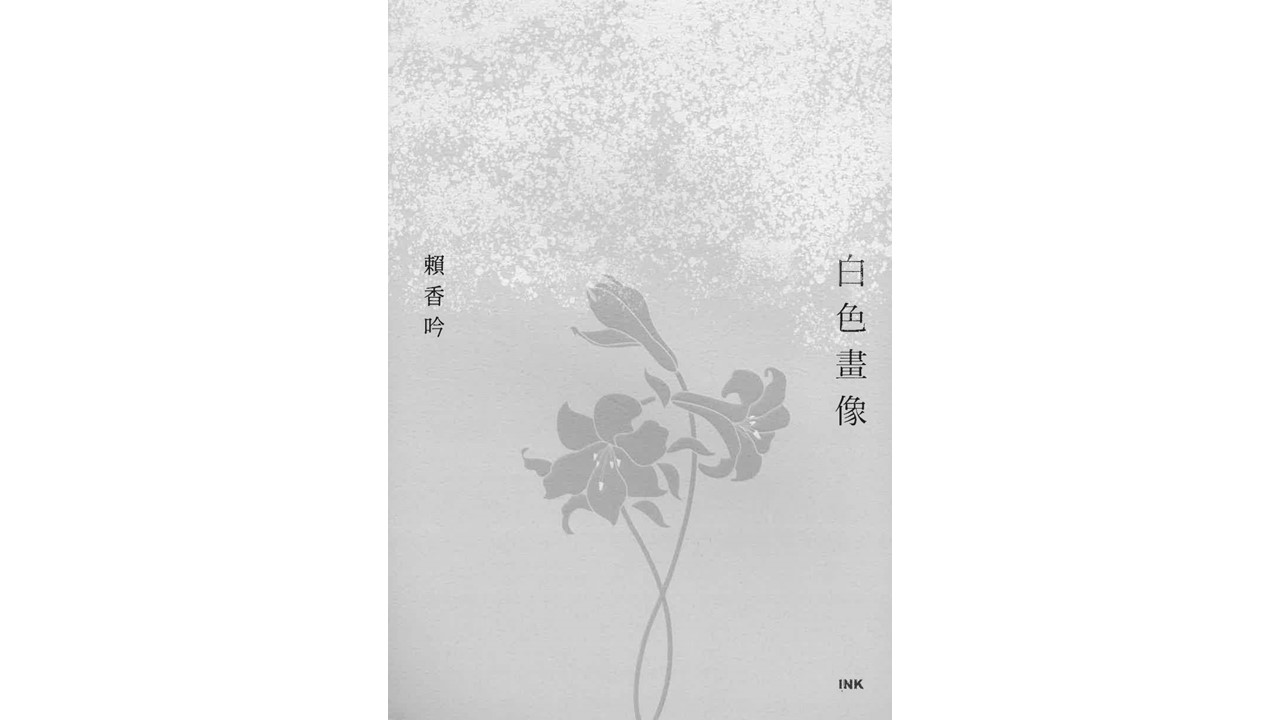
Kaori Lai's novel Portraits in White (白色畫像).
Two of the three main characters in Portraits in White come into their Taiwanese-ness through encounters with the foreign other. For teacher Ching-chih, it is coming across the Bible, the peculiar Western and Chinese amalgam that is Sun Yat-Sen's Three Principles of the People, and Ernest Hemingway's The Old Man and the Sea. For the singer and translator from Bangka, Casey, freedom is felt as she walks the Paris streets festooned with communist imagery, and the sentiment spreads and multiplies when she hears that Tokyo university has likewise been taken over by protestors.
As Lai observed in our interview, "People's Taiwanese consciousness was raised overseas." This was true to some extent for Lai, who, while aware of Taiwan's distinction from China despite her martial law-era schooling, began thinking about Taiwan's place in East Asia in earnest during her studies in Japan. She later returned to Taiwan to work briefly in cultural agencies such as the National Museum of Taiwanese Literature. Such a path has been common enough for many Taiwanese intellectuals, but what sets Lai apart from most local writers—with the curious counter-example of Lung Ying-tai, who also spent significant time in Germany—is how her time in Europe further shaped her perception of Taiwan. Living in Berlin for seven years, and interacting with East Germans and other Europeans who had lived under ostensibly socialist or communist regimes, she began to see how much of the paranoia and authoritarianism of life under KMT dictatorship—which mendaciously presented itself as "Free China" operating ideologically and administratively in line with Western democratic practice—actually had more in common with life behind the Iron Curtain.
Still, after all these years, Lai expresses little interest in recapitulating the heartache and pathos of Taiwan’s tragedies, even as such tragic histories serve as the backdrop for the goings-on of her books. The final novella of Portraits in White ends with two elderly Taiwanese, a long-exiled male political activist and a woman contemplating a long-overdue visit home, saying goodbye in Germany by sharing a European-style hug. This brief gesture of intimacy would be unlikely enough in Taiwan, where their age and gender and marital status would at most allow them to share a spot of tea, but the scene is set in Europe—a site of displacement and reinvention. Here, their shared yet isolated Taiwaneseness, and all the years that went into its cultivation are allowed to seep and stew and settle and conclude in an embrace. What a fine way to end a book, and as fitting a point as any to end an essay about the role of the other in the production of the self.
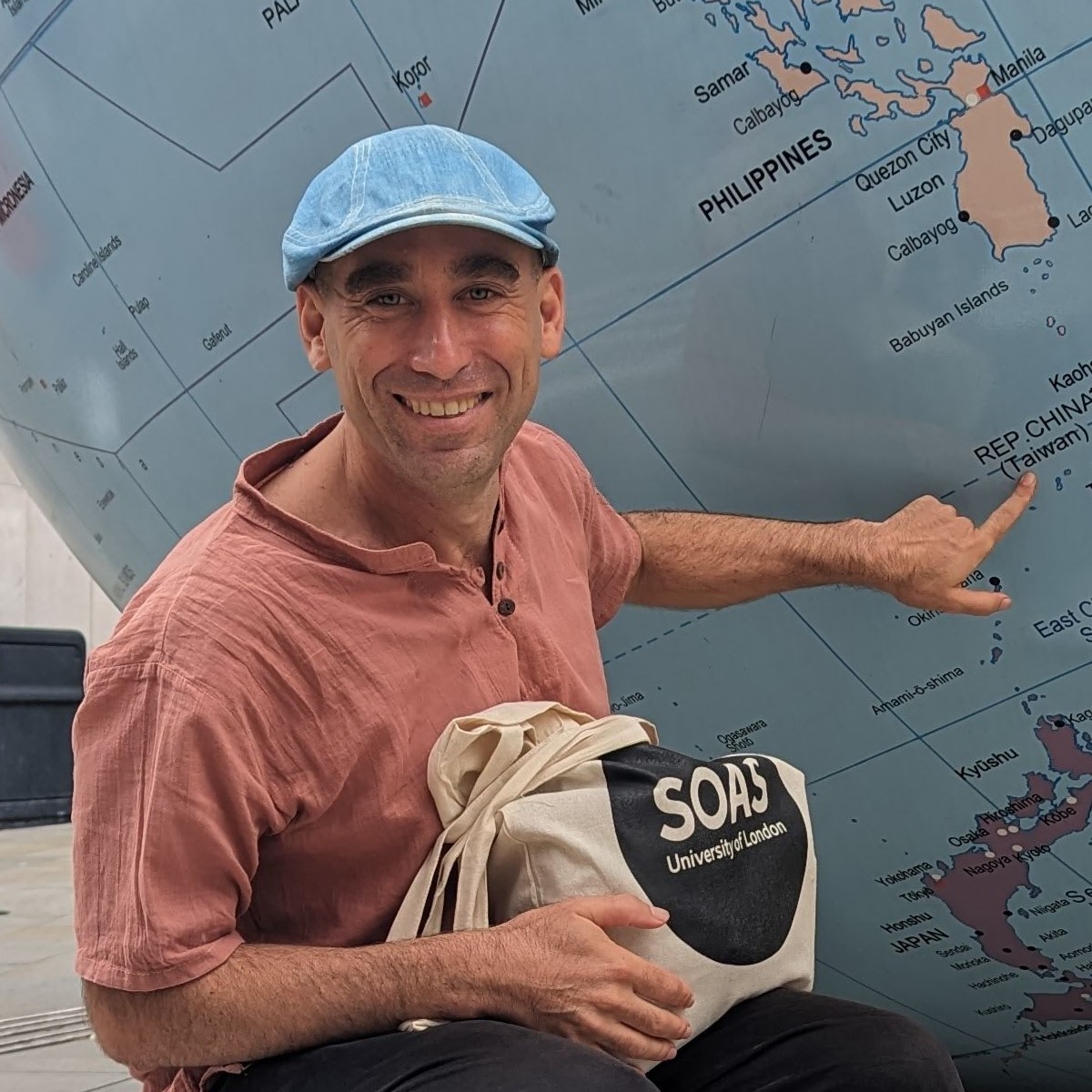
文章作者介紹
Ian Rowen
Ian Rowen (伊恩) is associate professor in the Department of Taiwan Culture, Languages, and Literature at National Taiwan Normal University. Trained as a geographer, he has published original research about social movements, tourism, geopolitics, and literature in East Asia. He is the author of One China, Many Taiwans: The Geopolitics of Cross-Strait Tourism (Cornell University Press, 2023) the editor of Transitions in Taiwan: Stories of the White Terror (Cambria Press, 2021), lead translator of Tibetan Environmentalists in China: The King of Dzi (Lexington Press, 2016), and co-editor (with Ti-han Chang and Darryl Sterk) of A Taiwanese Eco-literature Reader (forthcoming with Columbia University Press).